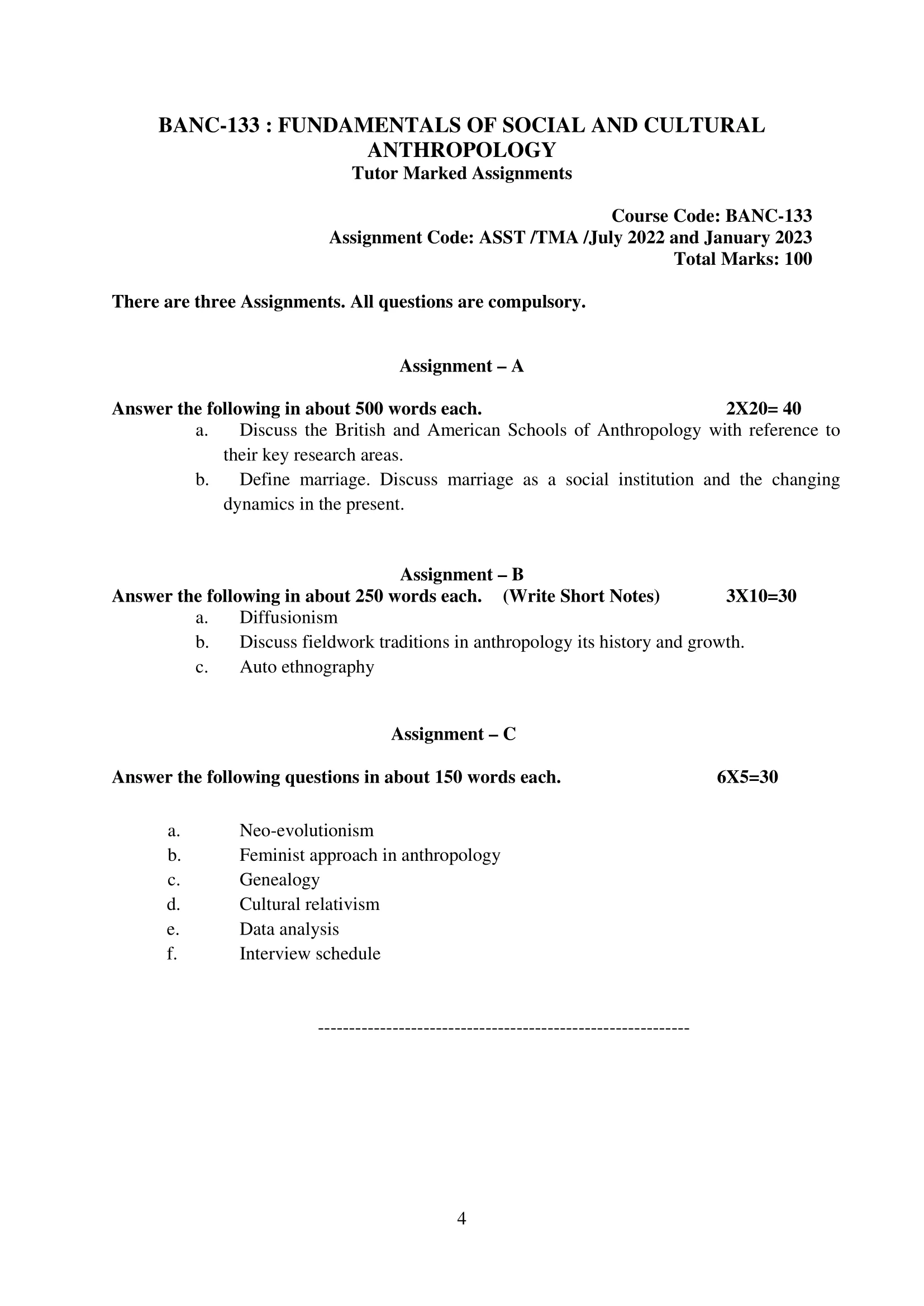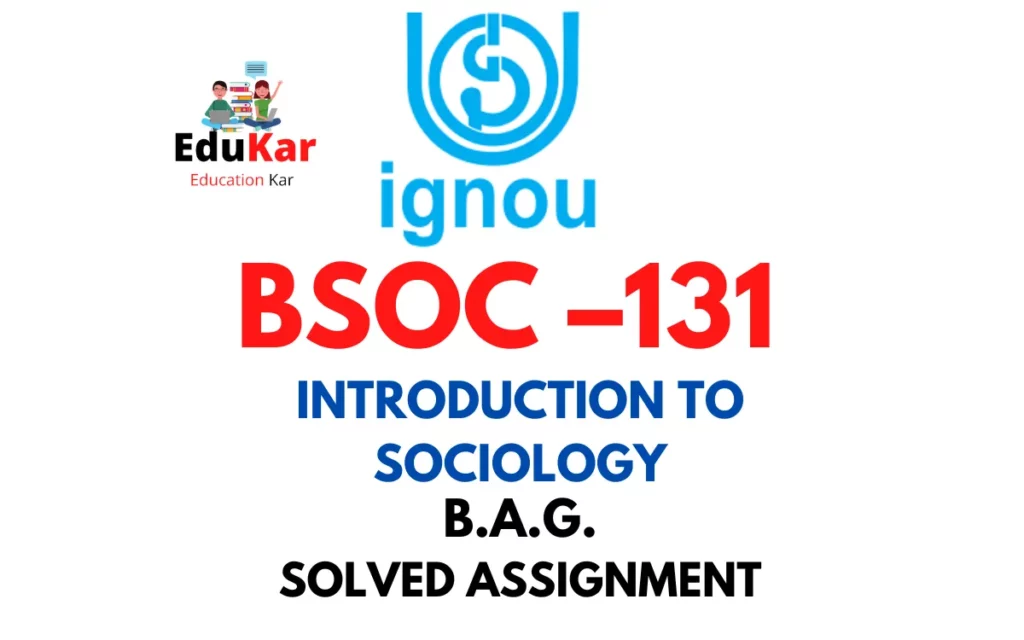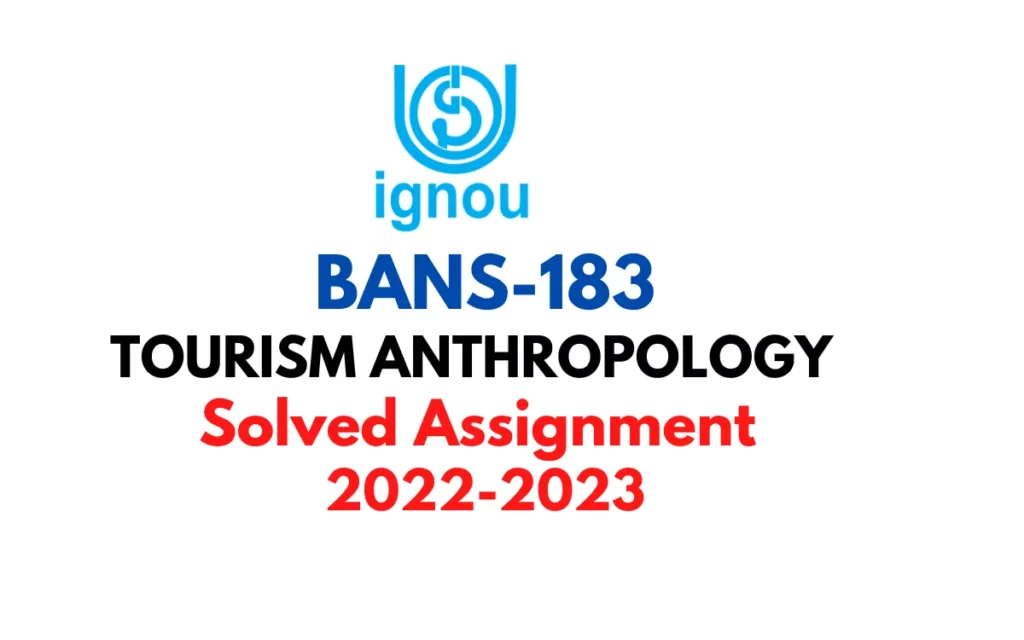Contents
- 1 Assignment – A
- 2 Answer the following in about 500 words each.
- 3 a. Discuss the British and American Schools of Anthropology with reference to their key research areas.
- 4 b. Define marriage. Discuss marriage as a social institution and the changing dynamics in the present.
- 5 Assignment – B
- 6 Answer the following in about 250 words each. (Write Short Notes)
- 7 a. Diffusionism
- 8 b. Discuss fieldwork traditions in anthropology its history and growth.
- 9 c. Auto ethnography
- 10 Assignment – C
- 11 Answer the following questions in about 150 words each.
- 12 a. Neo-evolutionism
- 13 b. Feminist approach in anthropology
- 14 c. Genealogy
- 15 d. Cultural relativism
- 16 e. Data analysis
- 17 f. Interview schedule

| Title | IGNOU: BANC-133 Solved Assignment 2022-2023 (FUNDAMENTALS OF SOCIAL AND CULTURAL ANTHROPOLOGY) |
| University | IGNOU |
| Degree | Bachelor Degree Programme |
| Course Code | BANC-133 |
| Course Name | FUNDAMENTALS OF SOCIAL AND CULTURAL ANTHROPOLOGY |
| Programme Name | Bachelor of Arts (General) |
| Programme Code | BAG |
| Total Marks | 100 |
| Year | 2022-2023 |
| Language | English |
| Assignment Code | ASST /TMA /July 2022 and January 2023 |
| Last Date for Submission of Assignment: | For June Examination: 31st March For December Examination: 30th September |

Assignment – A
Answer the following in about 500 words each.
a. Discuss the British and American Schools of Anthropology with reference to their key research areas.
Ans: Anthropology is the study of human beings and their behavior, both past and present. The discipline has two major schools of thought, the British and American Schools of Anthropology. These schools have distinct theoretical and methodological approaches to the study of human societies and cultures.
The British School of Anthropology, also known as social anthropology, was established in the late 19th century and is characterized by its holistic and comparative approach to the study of human societies. This school places an emphasis on the study of non-European cultures, and its researchers often live among the people they study in order to gain a deep understanding of their culture and social structures. The British School of Anthropology is particularly interested in understanding the way in which different cultures are interconnected and how they change over time. Key areas of research for this school include social organization, religion, and political systems.
The American School of Anthropology, also known as cultural anthropology, emerged in the early 20th century and is characterized by its focus on individual cultures and the study of human behavior and cognition. American anthropologists are interested in understanding the ways in which cultural beliefs and practices shape human behavior and thought processes. Key areas of research for this school include the study of beliefs, values, and norms, and the study of human communication and language. American anthropologists often use a more quantitative approach to research, utilizing statistical analysis to uncover patterns in cultural behavior.
Both the British and American Schools of Anthropology have made significant contributions to the field of anthropology, and both have influenced the direction of the discipline. The British School has helped to develop a comparative approach to the study of human societies, while the American School has contributed to the development of cultural relativism, the idea that cultural beliefs and practices should be understood within the context of a particular culture and not judged by the standards of another culture.
Ans: Marriage is a social institution that is defined as a legally recognized union between two individuals who are bound by a social, religious, or legal contract. Marriage is often seen as a symbol of commitment and love, and it is considered one of the oldest and most fundamental social institutions in human history. The purpose of marriage has changed over time, but it has traditionally been seen as a way of establishing families, providing security and support, and regulating sexual behavior.
As a social institution, marriage has been regulated by laws and customs that vary from culture to culture and from time to time. In many societies, marriage has been associated with a wide range of social, economic, and political benefits. For example, marriage has often been seen as a way of providing social stability, strengthening the bonds between families, and ensuring the continuation of cultural traditions. Marriage has also been linked to the transfer of property, the inheritance of wealth, and the formation of political alliances.
The dynamics of marriage as a social institution have changed dramatically in recent decades. One of the biggest changes has been the increasing acceptance of alternative forms of relationships, such as cohabitation and same-sex relationships. This has led to a growing recognition of the need for legal and social protections for individuals in non-traditional relationships, including same-sex couples. In many countries, same-sex marriage has been legalized, and couples have been granted the same legal rights and benefits as heterosexual couples.
Another major change has been the increasing rate of divorce and the growing number of individuals who are choosing to remain single. This has led to a more fluid and flexible definition of family and the role of marriage in society. For many people, the decision to marry or not to marry is no longer seen as a matter of social obligation, but rather as a personal choice that reflects individual preferences and values.
In addition to these changes, the role of women in marriage has also changed. Women have increasingly entered the workforce and have gained greater economic independence, which has given them more power and autonomy in their relationships. This has led to a shift in the balance of power within marriages and has had significant implications for the social and cultural norms associated with marriage.
Despite these changes, marriage remains a powerful and influential institution in many societies. While the form and meaning of marriage may be changing, it continues to be seen as an important symbol of commitment, love, and stability. Whether viewed as a social, legal, or religious institution, marriage continues to play a central role in shaping the lives of individuals and communities around the world.
Assignment – B
Answer the following in about 250 words each. (Write Short Notes)
a. Diffusionism
Ans: Diffusionism is a cultural anthropology theory that posits that cultural elements, such as technology, ideas, and customs, spread from one society to another through various means such as migration, trade, and conquest. It suggests that cultures are not isolated entities but are connected and influenced by one another.
Diffusionism emerged in the late 19th and early 20th centuries as a response to evolutionism, which claimed that all cultures go through a linear process of evolution from simple to complex. Diffusionists rejected this idea, arguing that cultural evolution was not uniform and that cultural elements could be adopted by societies without going through an evolutionary process.
One of the key proponents of diffusionism was the British archaeologist Sir James Frazer, who published “The Golden Bough” in 1890. Frazer’s work influenced other diffusionist theorists such as Franz Boas, who focused on the study of Native American cultures, and Marcel Mauss, who studied the exchange of goods and ideas in the Pacific.
Diffusionism was widely accepted in the early 20th century, but it fell out of favor in the mid-20th century due to criticisms that it oversimplified the complexity of cultural interactions and ignored the agency of individuals and societies in shaping their own cultures.
However, in recent years, diffusionism has seen a resurgence of interest among anthropologists, who have sought to incorporate its insights into more nuanced and complex models of cultural exchange. Today, diffusionism is often considered as one component of a broader understanding of cultural transmission that takes into account multiple factors, including colonialism, globalization, and technological innovations.
b. Discuss fieldwork traditions in anthropology its history and growth.
Ans: Fieldwork is a central tradition in the discipline of anthropology, which involves immersing oneself in a community or society for an extended period of time in order to gather data and gain a deeper understanding of its culture, beliefs, and practices. Fieldwork has been a defining feature of anthropology since its inception in the late 19th and early 20th centuries, when anthropologists first began traveling to different parts of the world to study the cultures of Indigenous peoples.
The history of fieldwork in anthropology is closely tied to the development of the discipline itself, which emerged as a separate field of study in the late 19th century. At that time, anthropologists began to view themselves as scientific observers of other cultures, and fieldwork was seen as a way to gather data about these cultures. Over the years, fieldwork has evolved and expanded, and today it is considered a cornerstone of anthropological research.
Fieldwork has grown in a number of important ways over the past century. One of the most significant developments has been the increased focus on participant-observation, which involves not only observing the activities of the community being studied but also participating in them. This allows the anthropologist to gain a deeper understanding of the culture and to build relationships with the members of the community.
Another important trend in the growth of fieldwork has been the increased emphasis on collaboration and empowerment. Anthropologists now recognize the importance of working with communities and taking their perspectives into account, rather than simply observing and analyzing them. They also seek to empower communities by giving them a voice in the research process and by using their findings to address the needs and concerns of the communities being studied.
c. Auto ethnography
Ans: Autoethnography is a method of qualitative research that allows the researcher to examine and reflect on their own personal experiences and cultural background. It is an attempt to understand the self within the context of culture, and to uncover the relationships between the personal and the cultural. This approach to research allows the researcher to bring their own subjective experiences to the forefront and to examine the ways in which these experiences intersect with larger cultural forces and societal structures.
Autoethnography has roots in both anthropology and sociology, and it draws on the theories and methods of both disciplines to create a unique approach to research. This method is particularly useful for exploring topics related to identity, culture, and personal experience, as it allows the researcher to gain a deeper understanding of their own experiences and to contextualize these experiences within a larger cultural framework.
In order to conduct an autoethnography, the researcher must first reflect on their own experiences and the cultural context in which these experiences took place. They must then use this reflection as a starting point for further inquiry, seeking out additional sources of data and information in order to gain a deeper understanding of their experiences and the cultural forces that shape them. This may involve conducting interviews with others, examining media and popular culture, or exploring historical and archival sources.
One of the key features of autoethnography is the use of personal narrative. The researcher must craft a story that captures the essence of their experiences and the cultural forces that shaped them. This narrative must be grounded in the specific details of the researcher’s experiences, but it must also be carefully crafted to reveal the larger cultural and societal structures that influenced these experiences.
Assignment – C
Answer the following questions in about 150 words each.
a. Neo-evolutionism
Ans: Neo-evolutionism is a theoretical perspective in anthropology that emerged in the mid-20th century. It is an updated version of the earlier evolutionary theories that were popular in the 19th and early 20th centuries. Neo-evolutionism is based on the idea that human societies progress through a series of stages of development, from simple to complex, and that this progress is a result of environmental, technological, and social factors.
Neo-evolutionists argue that human societies can be classified into different types based on their level of technological, political, and economic development. They also suggest that societies move from one stage to the next in a linear and predictable manner, with each stage building upon the achievements of the previous one. This perspective has been criticized for its oversimplification of cultural and social processes and for its emphasis on the role of technology in cultural development.
Despite these criticisms, neo-evolutionism has had a significant impact on the study of human societies and has influenced many other disciplines, including archaeology, sociology, and political science. It remains an important theoretical framework for understanding cultural change and evolution, and it continues to be used by anthropologists and other scholars as a way of explaining the development of human societies over time.
b. Feminist approach in anthropology
Ans: Feminist anthropology is a theoretical perspective that emerged in the late 20th century as part of the broader feminist movement. This approach seeks to challenge and disrupt patriarchal norms and power structures in the field of anthropology, as well as in wider society. Feminist anthropologists argue that traditional anthropological perspectives have been inherently biased towards the experiences and perspectives of men and that this has resulted in a distorted view of the world.
Feminist anthropology takes an intersectional approach, recognizing that gender is just one aspect of social identity and that it is intertwined with other factors such as race, class, and sexuality. This perspective emphasizes the importance of considering the experiences of women and other marginalized groups in the study of human societies.
Feminist anthropology has made important contributions to the field, including the development of new methodologies for conducting research and the creation of new theoretical frameworks for understanding the experiences of women and other marginalized groups. This approach has also challenged traditional anthropological understandings of gender roles and relationships, and has helped to bring attention to issues such as gender-based violence, reproductive rights, and the impact of globalization on women.
c. Genealogy
Ans: Genealogy is the study and tracing of family histories and lineages. It involves researching and documenting the relationships between individuals, families, and communities over time. Genealogy can involve the collection and analysis of various types of historical records, such as census data, birth and death certificates, and marriage licenses, as well as the use of oral histories and family stories passed down through generations.
Genealogy is often used to understand the cultural and social contexts in which families and communities have lived, and to uncover patterns of migration, settlement, and economic and social mobility. It can also provide insight into the relationships between families and communities, as well as the ways in which families have responded to and been shaped by historical events and social, economic, and political changes.
Genealogy can be a personal pursuit, as individuals seek to understand their own family histories, or a more academic or professional endeavor, as historians and genealogists work to build comprehensive and accurate family trees and records. It is also often used as a tool in genetic research, as scientists study the inheritance of genes and the relationships between family members.
d. Cultural relativism
Ans: Cultural relativism is a philosophical and anthropological concept that holds that all cultures should be understood and evaluated on their own terms, rather than being judged by the standards of another culture. This perspective argues that cultural norms, values, beliefs, and practices are relative to the culture in which they exist, and that there is no universal standard by which they can be judged as right or wrong.
The concept of cultural relativism was first developed by Franz Boas, a German-American anthropologist, in the late 19th and early 20th centuries. Boas argued that cultural differences should be understood as products of historical and geographical factors, and that cultural practices should not be evaluated in terms of their morality or correctness.
Cultural relativism has been a central concept in the field of anthropology, as it has helped to challenge colonial and Eurocentric perspectives that viewed non-Western cultures as inferior or primitive. This perspective has also been valuable in promoting greater understanding and tolerance of cultural differences and has been used as a tool for deconstructing stereotypes and promoting cross-cultural communication.
e. Data analysis
Ans: Data analysis is the process of examining, cleaning, transforming, and modeling data with the goal of discovering useful information, drawing conclusions, and supporting decision-making. It is a crucial step in the data science process, and involves a variety of techniques and methods for organizing, summarizing, and making sense of data.
Data analysis can involve the use of statistical techniques, such as hypothesis testing, regression analysis, and cluster analysis, to identify patterns and relationships in the data. It can also involve visual techniques, such as graphs, charts, and maps, to help represent and communicate findings.
In many fields, data analysis is used to make informed decisions, test theories, and generate new insights. For example, in business, data analysis can help organizations identify trends and patterns in customer behavior, predict future sales, and evaluate the effectiveness of marketing campaigns.
There are many tools and software programs available for data analysis, ranging from basic spreadsheet programs to more specialized tools, such as R and Python. These tools help to automate many of the processes involved in data analysis, making it possible to handle large and complex datasets.
f. Interview schedule
Ans: An interview schedule is a standardized set of questions or topics that is used to guide an interview. It is a written document that outlines the questions or topics that will be covered during the interview, as well as the order in which they will be asked. The purpose of an interview schedule is to ensure that all participants are asked the same questions and that important topics are not overlooked or omitted.
Interview schedules can be used in a variety of settings, including academic research, market research, and human resources. They are particularly useful in qualitative research, where they provide a structure and consistency to the interview process.
The development of an interview schedule requires careful planning and consideration of the research questions or goals of the study. The questions or topics included in the schedule should be relevant and directly related to the purpose of the interview, and should be worded in a clear and concise manner.
How to Download BANC-133 Solved Assignment?
You can download it from the www.edukar.in, they have a big database for all the IGNOU solved assignments.
Is the BANC-133 Solved Assignment Free?
Yes this is absolutely free to download the solved assignment from www.edukar.in
What is the last submission date for BANC-133 Assignment?
For June Examination: 31st March, For December Examination: 30th September










![[Solved Assignment] BPCS 188-APPLICATIONS OF SOCIAL PSYCHOLOGY (IGNOU-BAG) 2022-2023 BPCS 188-APPLICATIONS OF SOCIAL PSYCHOLOGY IGNOU BAG Solved Assignment 2022-2023](https://edukar.in/wp-content/uploads/2023/01/BPCS-188-APPLICATIONS-OF-SOCIAL-PSYCHOLOGY-IGNOU-BAG-Solved-Assignment-2022-2023-1024x640.webp)





